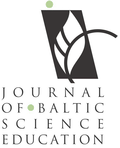Journal of Baltic Science Education
Export 260 results:
Sort by: Author [ Title ] Type Year
] Type Year Filters: First Letter Of Last Name is S [Clear All Filters]
(2014). YOUNG CHILDREN’S IDEAS ABOUT SNAIL INTERNAL ANATOMY. Journal of Baltic Science Education, Journal of Baltic Science Education, 13(6), Continuous. presented at the December/2014. doi:https://doi.org/10.33225/jbse/14.13.828
(2021). ON WOLVES AND BEES: FACTORS INFLUENCING THE NATURE RELATEDNESS OF THE PRE-SERVICE TEACHERS. Journal of Baltic Science Education, Journal of Baltic Science Education, 20(2), Continuous. presented at the April/2021. doi:https://doi.org/10.33225/jbse/21.20.252
(2008). WILL THE CONTRUCTIVIST APPROACH EMPLOYED IN SCIENCE TEACHING CHANGE THE “GRAMMAR” OF SCHOOLING?. Journal of Baltic Science Education, Journal of Baltic Science Education, 7(3). presented at the October/2008. Retrieved from http://oaji.net/articles/2014/987-1404720152.pdf
(2003). WHAT STUDENTS’ UNDERSTAND FROM ENTROPY?: A REVIEW OF SELECTED LITERATURE. Journal of Baltic Science Education, Journal of Baltic Science Education, 2(1). presented at the March/2003. Retrieved from http://oaji.net/articles/2017/987-1503927942.pdf
(2017). VALIDITY AND RELIABILITY ANALYSES FOR THE NATURE OF SCIENCE INSTRUMENT SECONDARY (NOSI-S). Journal of Baltic Science Education, Journal of Baltic Science Education, 16(3), Continuous. presented at the June/2017. doi:https://doi.org/10.33225/jbse/17.16.429
(2015). VALIDITY AND RELIABILITY ANALYSES FOR CHEMISTRY SELF-CONCEPT INVENTORY. Journal of Baltic Science Education, Journal of Baltic Science Education, 14(5), Continuous. presented at the October/2015. doi:https://doi.org/10.33225/jbse/15.14.599
(2017). THE VALIDITY AND EFFECTIVENESS OF PHYSICS INDEPENDENT LEARNING MODEL TO IMPROVE PHYSICS PROBLEM SOLVING AND SELF-DIRECTED LEARNING SKILLS OF STUDENTS IN OPEN AND DISTANCE EDUCATION SYSTEMS. Journal of Baltic Science Education, Journal of Baltic Science Education, 16(5), Continuous. presented at the October/2017. doi:https://doi.org/10.33225/jbse/17.16.651
(2017). VALIDATION OF THEORETICAL CONSTRUCTS TOWARD SUITABILITY OF EDUCATIONAL SOFTWARE FOR CHEMISTRY EDUCATION: DIFFERENCES BETWEEN USERS AND NONUSERS. Journal of Baltic Science Education, Journal of Baltic Science Education, 16(6), Continuous. presented at the December/2017. doi:https://doi.org/10.33225/jbse/17.16.873
(2020). VALIDATION OF THE PROCEDURE FOR THE ASSESSMENT OF COGNITIVE COMPLEXITY OF CHEMICAL TECHNOLOGY PROBLEM TASKS. Journal of Baltic Science Education, Journal of Baltic Science Education, 19(1), Continuous. presented at the February/2020. doi:https://doi.org/10.33225/jbse/20.19.64
(2013). VALIDATION OF A SCALE OF ATTITUDES TOWARD SCIENCE ACROSS COUNTRIES USING RASCH MODEL: FINDINGS FROM TIMSS. Journal of Baltic Science Education, Journal of Baltic Science Education, 12(5), Continuous. presented at the October/2013. doi:https://doi.org/10.33225/jbse/13.12.692
(2023). UTILIZATION OF PROCESS DATA IN CHINA: EXPLORING STUDENTS’ PROBLEM-SOLVING STRATEGIES IN COMPUTER-BASED SCIENCE ASSESSMENT FEATURING INTERACTIVE TASKS. Journal of Baltic Science Education, Journal of Baltic Science Education, 22(5), Continuous. presented at the October/2023. doi:https://doi.org/10.33225/jbse/23.22.929
(2014). USING CONCEPT MAPPING FOR ASSESSMENT IN SCIENCE EDUCATION. Journal of Baltic Science Education, Journal of Baltic Science Education, 13(5), Continuous. presented at the October/2014. doi:https://doi.org/10.33225/jbse/14.13.662
(2017). USER-FRIENDLY REPORTING OF RESEARCH FINDINGS FROM A QUESTIONNAIRE. Journal of Baltic Science Education, Journal of Baltic Science Education, 16(5), Continuous. presented at the October/2017. doi:https://doi.org/10.33225/jbse/17.16.632
(2022). USE OF RASCH ANALYSIS TO DEVELOP AN ARABIC LANGUAGE SURVEY (STPLTS) TO MEASURE OMANI SCIENCE TEACHERS' VIEWS TOWARDS THE CLASSROOM APPLICATION OF PEDAGOGICAL LEARNING THEORIES . Journal of Baltic Science Education, Journal of Baltic Science Education, 21(3), Continuous. presented at the June/2022. doi:https://doi.org/10.33225/jbse/22.21.513
(2013). UPPER SECONDARY STUDENTS` SELF-PERCEPTIONS OF BOTH THEIR COMPETENCE IN PROBLEM SOLVING, DECISION MAKING AND REASONING WITHIN SCIENCE SUBJECTS AND THEIR FUTURE CAREERS. Journal of Baltic Science Education, Journal of Baltic Science Education, 13(4), Continuous. presented at the August/2013. doi:https://doi.org/10.33225/jbse/14.13.544
(2014). UNDERSTANDINGS OF ADVANCED STUDENTS ON NATURE OF SCIENCE AND THEIR MOTIVATIONAL STATUS TO LEARN NATURE OF SCIENCE: A TURKISH CASE. Journal of Baltic Science Education, Journal of Baltic Science Education, 13(1), Continuous. presented at the February/2014. doi:https://doi.org/10.33225/jbse/14.13.46
(2006). TURKISH UNDERGRADUATE STUDENTS’ PERCEPTIONS ON THE FACTORS AFFECTING THE PROCESS OF THEIR LEARNING. Journal of Baltic Science Education, Journal of Baltic Science Education, 5(1). presented at the March/2006. Retrieved from http://oaji.net/articles/2014/987-1404214335.pdf
(2010). TURKISH STUDENTS’ MENTAL MODELS OF LIGHT TO EXPLAIN THE SINGLE SLIT DIFFRACTION AND DOUBLE SLIT INTERFERENCE OF LIGHT: A CROSS – SECTIONAL STUDY. Journal of Baltic Science Education, Journal of Baltic Science Education, 9(1). presented at the March/2010. Retrieved from http://oaji.net/articles/2014/987-1404741216.pdf
(2023). THE THINKING OF STUDENTS AGED 15-18 IN EXPLAINING THE DISSOLUTION PHENOMENON. Journal of Baltic Science Education, Journal of Baltic Science Education, 22(2), Continuous. presented at the April/2023. doi:https://doi.org/10.33225/jbse/23.22.337
(2013). TEACHING GENERAL CHEMISTRY WITH INSTRUCTOR’S SCREEN SHARING: STUDENTS’ OPINIONS ABOUT THE IDEA AND ITS IMPLEMENTATION. Journal of Baltic Science Education, Journal of Baltic Science Education, 12(6), Continuous. presented at the December/2013. doi:https://doi.org/10.33225/jbse/13.12.759
(2010). TEACHING ELECTROLYSIS OF WATER THROUGH DRAMA. Journal of Baltic Science Education, Journal of Baltic Science Education, 9(3). presented at the September/2010. Retrieved from http://oaji.net/articles/2014/987-1405171882.pdf
(2020). TEACHERS’ PERCEPTIONS OF USING THE BLENDED LEARNING APPROACH FOR STEM-RELATED SUBJECTS WITHIN THE FOURTH INDUSTRIAL REVOLUTION. Journal of Baltic Science Education, Journal of Baltic Science Education, 19(4), Continuous. presented at the August/2020. doi:https://doi.org/10.33225/jbse/20.19.583
(2020). THE TEACHER’S ROLE IN THE BATTLE OF THE INTELLIGENT MACHINES. Journal of Baltic Science Education, Journal of Baltic Science Education, 19(1), Continuous. presented at the February/2020. doi:https://doi.org/10.33225/jbse/20.19.04
(2014). TEACHER EDUCATORS’ VIEWS OF “MODEL” CONCEPT AND THEIR MENTAL MODELS. Journal of Baltic Science Education, Journal of Baltic Science Education, 13(5), Continuous. presented at the October/2014. doi:https://doi.org/10.33225/jbse/14.13.674
(2018). TAKE-HOME-EXPERIMENT: ENHANCING STUDENTS’ SCIENTIFIC ATTITUDE. Journal of Baltic Science Education, Journal of Baltic Science Education, 17(5), Continuous. presented at the October/2018. doi:https://doi.org/10.33225/jbse/18.17.828
